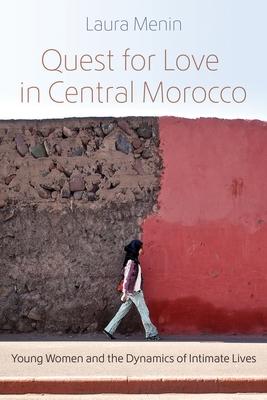Following the 2011 wave of revolutions and protests in North Africa and the Middle East, new discussions of individual freedoms emerged in the Moroccan public sphere and human rights discourse. A segment of the public rallied aroundthe removal of an article in the penal code that punished sexual relationships outside of marriage. As debates about personal and sexual freedom gain momentum, love and intimacy remain complex issues. Moving between public, clandestine, and online interactions, Quest for Love in Central Morocco explores the creative ways young women navigate desire and morality.
Menin's ethnography focuses on young women living in the low-income and lower-middle-class neighborhoods of a midsized town in Central Morocco, far from the overt influence of city life. At the heart of the book, Menin draws upon ideas of "love" as an ethnographic object and source of theoretical examination. She demonstrates that love, as a complex cultural and historical phenomenon shaped through intersecting socioeconomic and political developments, is crucial in thinking through generational changes and debates in Morocco and the Middle East more broadly. What is at stake in the quest for love, she argues, is not only the making of gendered selves and intimate relationships, but also the imagination of social and political life.
Book
Quest for Love in Central Morocco: Young Women and the Dynamics of Intimate Lives
by Laura Menin
(Write a Review)
$105.56
Following the 2011 wave of revolutions and protests in North Africa and the Middle East, new discussions of individual freedoms emerged in the Moroccan public sphere and human rights discourse. A segment of the public rallied aroundthe removal of an article in the penal code that punished sexual relationships outside of marriage. As debates about personal and sexual freedom gain momentum, love and intimacy remain complex issues. Moving between public, clandestine, and online interactions, Quest for Love in Central Morocco explores the creative ways young women navigate desire and morality.
Menin's ethnography focuses on young women living in the low-income and lower-middle-class neighborhoods of a midsized town in Central Morocco, far from the overt influence of city life. At the heart of the book, Menin draws upon ideas of "love" as an ethnographic object and source of theoretical examination. She demonstrates that love, as a complex cultural and historical phenomenon shaped through intersecting socioeconomic and political developments, is crucial in thinking through generational changes and debates in Morocco and the Middle East more broadly. What is at stake in the quest for love, she argues, is not only the making of gendered selves and intimate relationships, but also the imagination of social and political life.Hardcover
$105.56